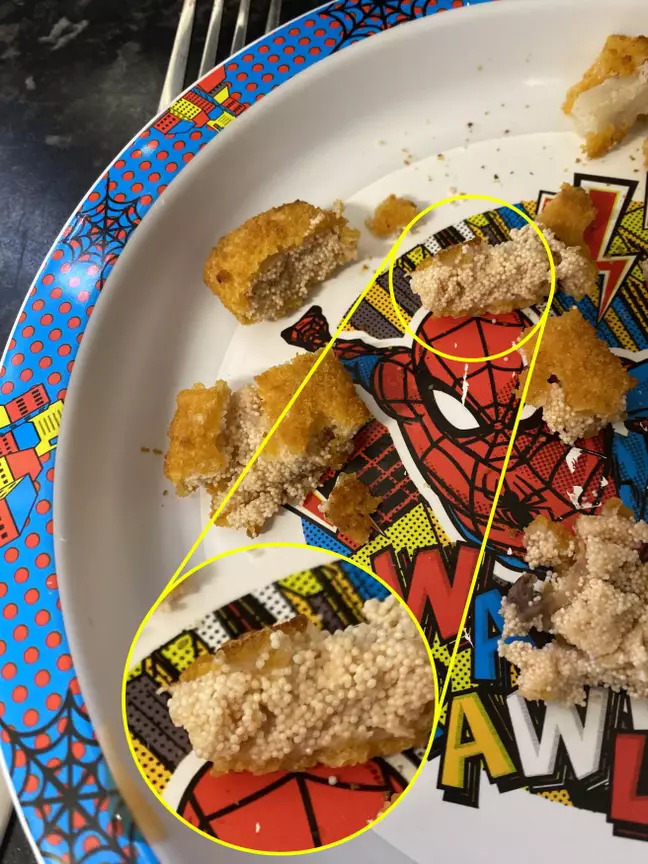Mum Left Gagging After Finding Fish Eggs In Asda Fish Fingers
Mum left gagging after finding fish eggs in Asda fish fingers! A Middlesbrough mother was left feeling disgusted after discovering what she thought were fish eggs in a box of Asda Essentials fish fingers.
Author:Morgan MaverickReviewer:Raven NoirMar 30, 20237 Shares741 Views

Mum left gagging after finding fish eggs in Asda fish fingers! A Middlesbrough mother was left feeling disgusted after discovering what she thought were fish eggs in a box of Asda Essentials fish fingers.
Mum Left Gagging After Finding Fish Eggs In Asda Fish Fingers
Chelsea Freer, 25, noticed something amiss when she cut into one of the fish fingers to check if it was cooked. Instead of finding minced Alaska pollock, she found "hundreds" of white balls inside it.
Freer immediately shared her experience on Facebook to warn others about the unusual discovery.
She wrote:
“„When I saw the eggs I felt sick looking at them. I gagged. When I chopped another one in half, it was alright, but I threw them all in the bin. It's put me off buying fish from there.
Asda responded to the incident by apologizing to Freer and confirming that they had received no similar complaints. However, they did note that there is always a small risk of fish eggs making their way into the final product despite processes in place throughout the supply chain to prevent this from happening.
While fish eggs, also known as roe, are considered a delicacy in some parts of the world, they are not typically included in frozen fish products like fish fingers. The unexpected discovery of fish eggs in a product that is meant to contain only minced fish is particularly unsettling for some consumers.
Freer received a £5 voucher for the box of fish fingers but refused another box of the same product. She has also made an email complaint to the supermarket.
The incident has left Freer wary of giving fish fingers to her two-year-old son, Leland, who loves the food. "My boyfriend has said, make sure you don't give him fish fingers ever again," she said.
Freer's decision to share her experience on social media highlights the power of consumer voices in shaping the food industry.
Social media has provided consumers with a platform to share their experiences and opinions, and companies have had to adapt to meet the demands and expectations of their customers.
The discovery of fish eggs in a food product meant to contain minced fish is sure to raise concerns among consumers. Asda's response and actions to address the issue will likely be scrutinized by other consumers as well.
Conclusion
This incident serves as a reminder to all consumers to be vigilant when it comes to the food they consume. While companies have processes in place to ensure the quality and safety of their products, unexpected incidents can still occur.
By speaking up and sharing their experiences, consumers can hold companies accountable and push for greater transparency and accountability in the food industry.

Morgan Maverick
Author
Morgan Maverick is an unorthodox news reporter driven by an insatiable hunger for the truth. Fearless and unconventional, he uncovers hidden narratives that lie beneath the surface, transforming each news piece into a masterpiece of gritty authenticity. With a dedication that goes beyond the boundaries of conventional journalism, Morgan fearlessly explores the fringes of society, giving voice to the marginalized and shedding light on the darkest corners.
His raw and unfiltered reporting style challenges established norms, capturing the essence of humanity in its rawest form. Morgan Maverick stands as a beacon of truth, fearlessly pushing boundaries and inspiring others to question, dig deeper, and recognize the transformative power of journalism.

Raven Noir
Reviewer
Raven Noir is a captivating and enigmatic news reporter who unravels mysteries with a relentless pursuit of truth. Possessing an insatiable curiosity and an astute mind, Raven delves into the depths of complex stories, unearthing secrets that lie beneath the surface. With a masterful grasp of deduction and observation, Raven stands as a beacon of fearless investigation.
In the realm of journalism, Raven is known for his enigmatic presence, drawing people in with an aura of intrigue. Driven by an unwavering passion for unveiling the truth, Raven Noir continues to shed light on the darkest corners of society. Through captivating storytelling and unwavering determination, he challenges conventions and uncovers enigmatic secrets that lie just beyond the surface.
Latest Articles
Popular Articles
